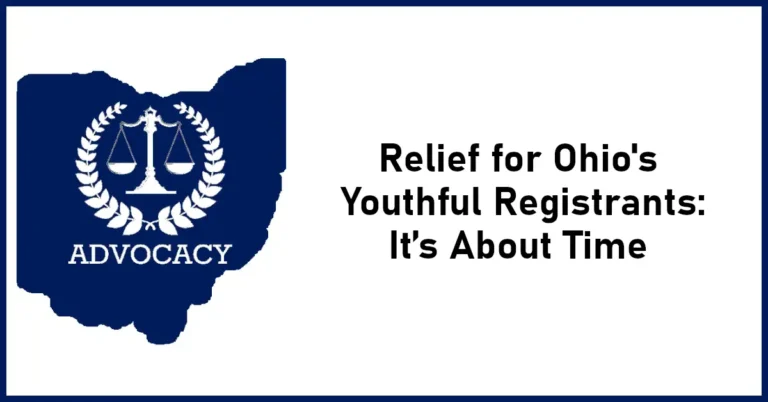by Barb Wright
July 2021
It has been said that we need three things to effect change: legislation, litigation, and education (not necessarily in that order). These two articles describe developments in the first two areas and present important educational opportunities for our members.
South Carolina Supreme Court Nixes Lifelong Registration Requirement as Unconstitutional (summarized below) reminds us that sexual offense laws are unjust, ineffective, and even counterproductive. Clearly, lifetime registration of individuals who pose little to no risk to society makes the registry over-inclusive and burdensome. California, in deciding to adopt a three-tier system, stressed that a strong, limited registry is a more effective tool for law enforcement and the public, and that risk assessment is an important part of that tool.
This is not the first such ruling but is the exception rather than the rule. Its value is in educating lawmakers that sexual offense registration simply does not work.
Prestigious American Law Institute Recommends Sweeping Changes to Model Penal Code Regarding Sexual Offense Registration (also summarized below) presents what appears to be a roadmap to sweeping reform. These recommendations do not present anything new: the Ohio Criminal Justice Recodification Committee made similar recommendations in 2017. And the American Society for the Treatment of Sexual Abusers (ATSA) also recommended curtailing sexual offense registration and its collateral consequences. The difference is that the Model Penal Code is in a position to influence legislation for years to come. Still, the ALI recognizes that registries and their associated features “currently command overwhelming public support, based on emotions and intuitions not easily dislodged.”
Change will not happen overnight and not without a concerted effort by individuals and groups which oppose the registry. In other words, change will not occur without you.
OH-RSOL and its members are attempting to effect that change. We have been actively involved with legislation and have filed an amicus brief in one Ohio Supreme Court case. But we need an army to effect change. We need soldiers on the front line and support for those at home.
→ Wanna join us in the fight?
South Carolina Supreme Court Nixes Lifelong Registration Requirement as Unconstitutional
https://narsol.org/2021/06/sex-offense-registration-for-life-unconstitutional-says-sc-supreme-court/
Legislatures have maintained that registration is a civil regulatory scheme, not punishment; therefore, legislation which arbitrarily assigns tiers based upon the offense, rather than risk factors or even individual facts of the case, does not require due process. The Supreme Court has ruled that classification satisfies any due process requirements. However, courts are starting to recognize that a registration scheme which severely restricts where an individual works, lives, or spends free time is indeed punishment. This is especially true in states which maintain lifetime registration for all offenses.
South Carolina, like many other states, requires lifetime registration for the most minor sexual offenses, with no opportunity to petition for removal. The South Carolina Supreme Court, in reviewing the petition of a man registered for the equivalent of Ohio’s Importuning, a Tier I offense requiring fifteen-year registration, ruled as follows:
“The lifetime inclusion of individuals who have a low risk of re-offending renders the registry over-inclusive and dilutes its utility by creating an ever-growing list of registrants that is less effective at protecting the public and meeting the needs of law enforcement … Moreover, there is no evidence [that] … all sex offenders generally pose a high risk of re-offending.” The South Carolina Supreme Court gave the legislature 12 months to rewrite the law to allow offenders an opportunity for “judicial review.”
This case does not directly impact Ohio for a number of reasons. Two reasons are that Ohio does not have lifetime registration for all offenses and does offer a petition for early relief for Tier I offenders. But this article gives important talking points about the importance of risk assessment in any registration scheme. (See also Lingle v. State, Slip Opinion No. 2020-Ohio-6788: https://view.publitas.com/p222-5250/vol-xiv-no-1/page/2-3)
Prestigious American Law Institute Recommends Sweeping Changes to Model Penal Code Regarding Sexual Offense Registration
The American Law Institute (ALI), established in 1923, is the leading independent organization in the United States producing scholarly work to clarify, modernize, and otherwise improve the law. The ALI consists of leading attorneys, law professors, and judges and has long influenced the nation’s legislation, which includes adopting a Model Penal Code (MPC) for states to follow.
The MPC is a model. There is no requirement that states follow the recommendations therein. Until recently, the ALI was remarkably silent on sexual offense registration, even as that registration evolved into the draconian scheme it is today.
In 2012, the ALI began a project to study the Model Penal Code chapter on sentencing and collateral sanctions for sexual assault and related offenses. The project team was comprised of practicing attorneys, judges, and scholars who are experts in sexual offense registration. Not surprisingly, the team found that evidence overwhelmingly shows the cost of registration, together with the onerous burden it places on anyone required to register for a conviction of a sexual offense, renders it ineffective and even counterproductive to its goal of protecting the public.
The membership of the ALI gave its final approval to a revision of the MPC’s chapter on Sexual Assault and Related Offenses on June 8, 2021. The Tentative Draft, totaling 600 pages long, includes an Executive Summary and “blackletter law” recommending the following changes:
- Registration will be limited to five offenses committed within Ohio (with guidance as to offenses committed outside Ohio):
-
- Sexual Assault by Aggravated Physical Force or Restraint
- Sexual Assault by Physical Force, but only when committed after the offender had previously been convicted of a felony sex offense
- Sexual Assault of an Incapacitated Person, but only when committed after the offender had previously been convicted of a felony sex offense
- Sexual Assault of a Minor, but only when the minor is younger than 12 and the actor is 21 years old or older
- Incestuous Sexual Assault of a Minor, but only when the minor is younger than 16
- The maximum period for registration will be 15 years, with removal after 10 years for good behavior.
- The sexual offense registry will no longer be public but will only be available to law enforcement personnel.
- Community notification will be eliminated.
- Many of the burdens imposed by registration or related laws, including GPS monitoring, many bars on employment, restrictions on Internet access, and residency restriction, will be available on a case-by-case basis only, based upon determination of the risk and needs of the offender.
- Failure to register is a misdemeanor if the individual “knowingly” fails to register, update, or verify information, and has no affirmative defense.
- An offender may file a petition for relief at any time prior to expiration of sentencing obligations and collateral sanctions, including the duty to register.
The current Council of the ALI includes seven members of the United States Courts of Appeal, as well as Justices on the highest courts of California, Arizona, Texas, and New Jersey. This Council agreed on January 22 to recommend the membership’s final approval of the completed project (including the changes stated above). The recommended changes of this project are still subject to further comment and review and do not become the official position of the Institute until they are adopted by the members.
→ If you want to help us fight to change registry laws and thereby mitigate damage the registry causes to registrants, their loved ones, and ultimately society, contact chair@ohrsol.org.


